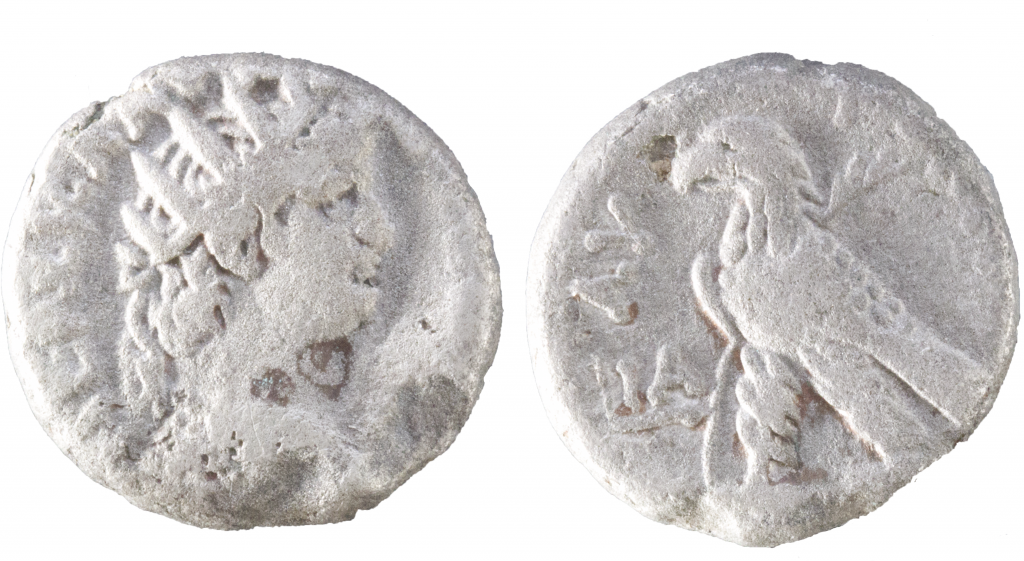June 9, 2015, by Will Leveritt
On this day in AD68 Nero committed suicide
Text by Andrew Fox
Image © Mint Imperials
On the 9th of June, AD 68, the Emperor Nero committed suicide, the first Emperor to do so. He was the last member of the Julio-Claudian dynasty, and had reigned for thirteen years, seven months, and twenty-five days.

Billon tetradrachm of Nero. Obverse shows radiate head of emperor right, NERW KLAV KAI SEB GEP. Reverse had eagle with palm branch left, with AVTOKRA. Date mark L IA (= regnal year 11, AD64/5 ). 23mm, 11.22g, 12 o’clock.
The turbulent period after he died would later become known as the Year of the Four Emperors, culminating in the rise of the Flavian dynasty. The personal legacy left by Nero is as one of the most notorious tyrants ever to rule the Roman Empire. He is remembered as the Emperor who fiddled as Rome burnt, who brutally murdered his mother, and for his gruesome taste in outdoor lighting: burning Christians.
However, his death, as reported by the imperial biographer Suetonius, did not reflect this extreme taste for gore. Instead, it showed the cowardly Emperor, the utterly inept ruler, and the corrupt spirit of a man led astray by luxury, the chief of all vices in the Stoic Rome Nero lived in.
The successful suicide was not Nero’s first attempt: he had considered suicide four times previously. First, he had obtained poison, typically an effeminate means of suicide in the Roman world. Second, he called for the gladiator Spiculus to come to his side to kill him, and when Spiculus was unavailable, some other executioner. Nero was then encouraged to commit suicide by his attendants, and upon discovering that he had been declared a public enemy by the Senate, he took two daggers and tested their blades, before declaring them to be unsuitable for killing himself with. Finally, with the help of one of his freedmen, Epaphroditus, Nero drove a knife through his own neck, and as a centurion burst in and attempted to stop the bleeding, the Emperor uttered his last words ‘Too late’, and ‘This is loyalty.’
The manner in which an emperor dies in Suetonius’ imperial biographies is exemplary of the manner in which they lived. For Nero, all the immoralities of his life were reflected in his death, from effeminacy to cowardice. His first attempt, through poison, was historically a woman’s method of suicide, and reflected his habit of cross-dressing, which was looked down upon by Suetonius. His next two methods, calling for the gladiator and upon encouragement from his attendants, are examples of Nero’s general habit of lowering himself to participate in the arena, and of relying too heavily on the advice of his subordinates. When Nero tested two daggers, and put them to one side, he demonstrated his ineptitude at war as well as his unwillingness to participate in it. Nero had demonstrated no interest in military expansion during his life, and when presented with the opportunity to end it with a violent act, he postponed. When Nero did manage to end his life, he demanded an example be set for him by someone else dying before him, and could not wield the dagger alone. In his reign, Nero relied upon the advice of others, often his freedmen, and in his death, he relied on one again, reflecting his life.
Nero left the Empire in a state of turmoil, and was remembered as a tyrant, under whom even writing had become dangerous. The empire would become the prize in a civil war, contested between four men vying to be emperor. The eventual victor, Vespasian, would set about rebuilding Rome, and would be celebrated as a restorer of Rome’s moral virtues.
No comments yet, fill out a comment to be the first

Leave a Reply